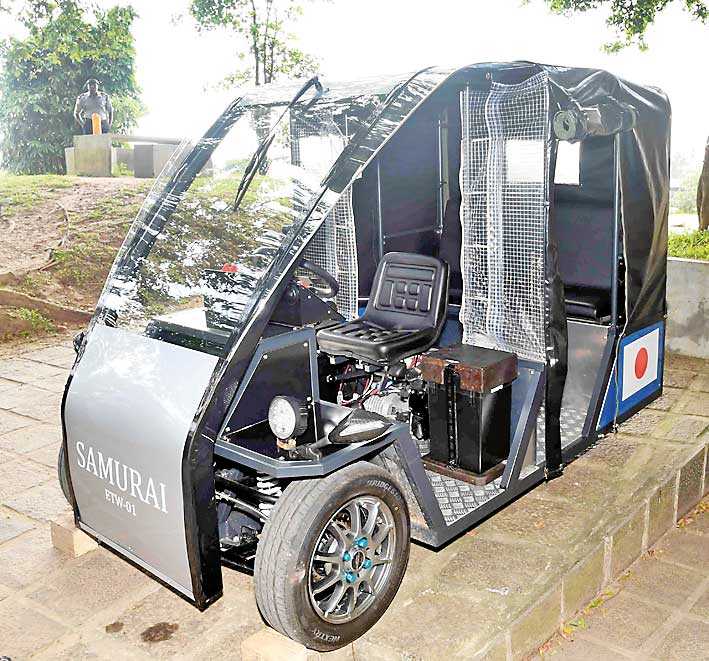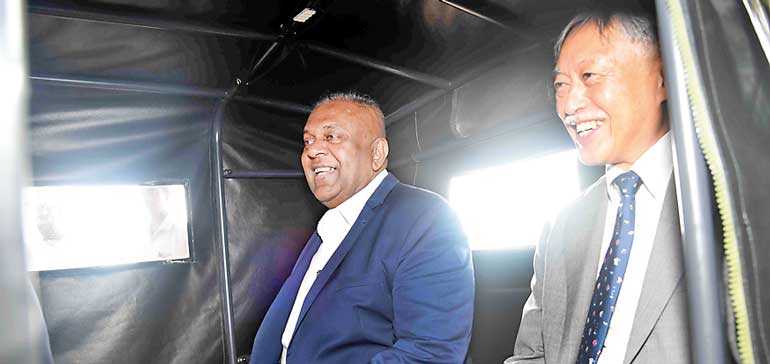Tuesday Feb 17, 2026
Tuesday Feb 17, 2026
Tuesday, 24 July 2018 00:18 - - {{hitsCtrl.values.hits}}


Finance Minister Mangala Samaraweera takes a ride in an electric three-wheeler with Japanese Ambassador Kenichi Suganuma during the launch
The Government yesterday introduced electric three-wheelers in an effort to improve sustainability and lower transportation costs to boost the industry.
Speaking at the launch, Finance Minister Mangala Samaraweera noted that the number of three-wheelers in Sri Lanka has increased eight-fold since the year 2000. The fuel consumption per person has increased from 90 litres to 150 litres during the same time, he observed. In 2017, Sri Lanka spent nearly $ 3.5 billion to import fossil fuels for the generation of electricity and transportation, which is equivalent to around 4% of GDP.
He emphasised that Sri Lanka therefore needs a long-term sustainable solution to mitigate the negative environmental consequences that have arisen as well as a solution to minimise the foreign exchange outflows from the country.
“The import taxes on a diesel three-wheeler will be increased by Rs. 50,000 to encourage the transition to environmentally friendly alternatives. Furthermore, under the Enterprise Sri Lanka credit schemes, the Ministry of Finance will incorporate a subsidised loan scheme to enable three-wheeler drivers to invest in a multitude of additional services, including meters, Wi-Fi, and GPS facilities, that would act as value-added services that are already provided to consumers; both domestic and tourists. We are also developing a proposal to encourage entrepreneurship amongst the spouses of three-wheeler drivers,” he said.
With over one million three-wheeler drivers in Sri Lanka, the three-wheeler industry has become a major sector of the country. The ‘Sri Lankan tuk’ has transformed into an icon as it is used in myriad aspects. It is an affordable means of transport for small businesses, providing last mile connectivity for small and medium enterprises and entrepreneurs. Three-wheelers are a means of affordable private transportation as well, and is increasingly popular in the tourism industry, the Minister added.
“As such, the Government of Sri Lanka has recognised the importance of this sector to the economy and intends to further empower those involved in the industry. One such example is from the 2018 budget, where we conceived the ‘tourist friendly tuk-tuk’ concept in collaboration with the hospitality industry. This program provides for existing three-wheeler drivers to register with the SLTDA so that a three-wheeler would not only be a mode of transportation, but enables the driver to serve as a local tour guide as well. This policy was initiated to create a win-win situation for all stakeholders involved and improve the quality of services provided in the tourism industry. I am pleased to announce that the implementation is progressing well and thus far, 589 drivers have undergone training.”
The Minister stated that he was encouraged by the electric three-wheeler developed by Japan-Sri Lanka Comprehensive Partnership secretariat and T-PLAN, which is considered to have incorporated cutting-edge technology into the industry.
“I understand that the first batch of electric three-wheelers manufactured in Sri Lanka will be ready by mid-2020, in time for the 2020 Tokyo Olympics. It is very exciting to hear that T-PLAN hopes to export the Sri Lankan made electric vehicles to Japan. This would be the first of many technology transfer projects that are currently being incubated by the Japan Sri Lanka Comprehensive Partnership secretariat.”